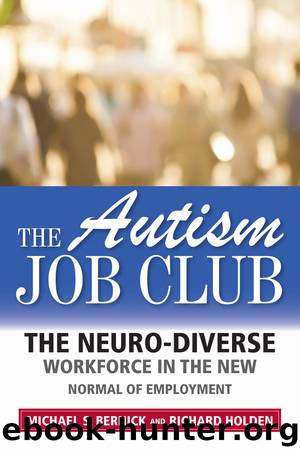The Autism Job Club by Michael S. Bernick

Author:Michael S. Bernick
Language: eng
Format: epub
Publisher: The New Press
Published: 2014-12-31T16:00:00+00:00
12
AUTISM AND THE INTERNET ECONOMY
AT A RECENT AASCEND board meeting, we were discussing the job club schedule when Adam Pollack, a senior member of our group in his sixties, interrupted: “I’m not looking for a job, I couldn’t get a job, or hold a job. But I’d like to find some way of generating income.”
He went on to say that he did “mathematical discoveries.” Perhaps, he said, someone would pay him for these discoveries. Also, he had taken photographs over the years and “friends have suggested that they might be of value.”
A number of our club members are in micro-businesses or other forms of self-employment, sometimes in addition to a part-time job. As set out in Chapter 6, Stacey has a pet-sitting business, Paul a handyman business, and Andrew does pillow design and sculpts in addition to his part-time recycling position. Additionally, we have Don who repairs computers and Craig who is a piano tuner.
Most of these market endeavors are marginal, bringing in a little income to supplement SSI or SSDI payments. At the same time, Adam’s point about looking at economic participation and income beyond the concept of a job, is a sound one.
The Internet economy, and especially two parts of it, the share economy and the social mission economy, are reshaping the nature of employment. They are giving rise to more and more opportunities to generate income through efforts outside of traditional full-time or even part-time employment. These opportunities will be available to all persons, and may provide particular opportunities for the autism community.
The Internet Economy and the Share Economy
First, a word about the Internet economy, especially the Internet commerce/social media economy, and the employment opportunities it generates.
San Francisco is ground zero for this Internet commerce/social media economy in the United States and illustrates the economic activity being generated. Young entrepreneurs from around the world are flocking to the area, especially to a one-mile radius around Second and Howard streets in the South of Market district.
Walk through San Francisco’s South of Market and nearby area and you find thousands of new business ventures. The entrepreneurs, usually in their twenties or early thirties, are engaged in businesses to provide goods and services in new ways through the Internet. The business offices may be a few desks or tables in a sparsely decorated room or two. Or they may be a series of laptops around a large table in a business incubator for newly established businesses or “business accelerator” for start-ups that have some track record. Rocketspace is one such business accelerator. It started in a former coffee warehouse at 181 Fremont and has recently moved to larger space a few blocks away, just above Market Street. As an accelerator it seeks to push forward technology start-ups, through flexible office space, sharing of ideas, access to capital, and access to technology talent.
Rocketspace houses around 120 start ups at any time. The line-up changes regularly since Rocketspace encourages companies to leave when they reach thirty employees. Among the start-ups operating recently
Download
This site does not store any files on its server. We only index and link to content provided by other sites. Please contact the content providers to delete copyright contents if any and email us, we'll remove relevant links or contents immediately.
The Secret History by Donna Tartt(16622)
The Social Justice Warrior Handbook by Lisa De Pasquale(11489)
Thirteen Reasons Why by Jay Asher(7788)
This Is How You Lose Her by Junot Diaz(5770)
Weapons of Math Destruction by Cathy O'Neil(5036)
Zero to One by Peter Thiel(4824)
The Myth of the Strong Leader by Archie Brown(4789)
Promise Me, Dad by Joe Biden(4447)
Beartown by Fredrik Backman(4415)
Stone's Rules by Roger Stone(4415)
How Democracies Die by Steven Levitsky & Daniel Ziblatt(4398)
The Fire Next Time by James Baldwin(4342)
100 Deadly Skills by Clint Emerson(4076)
A Higher Loyalty: Truth, Lies, and Leadership by James Comey(4032)
Rise and Kill First by Ronen Bergman(4012)
The David Icke Guide to the Global Conspiracy (and how to end it) by David Icke(3881)
The Farm by Tom Rob Smith(3872)
Secrecy World by Jake Bernstein(3782)
The Doomsday Machine by Daniel Ellsberg(3730)
